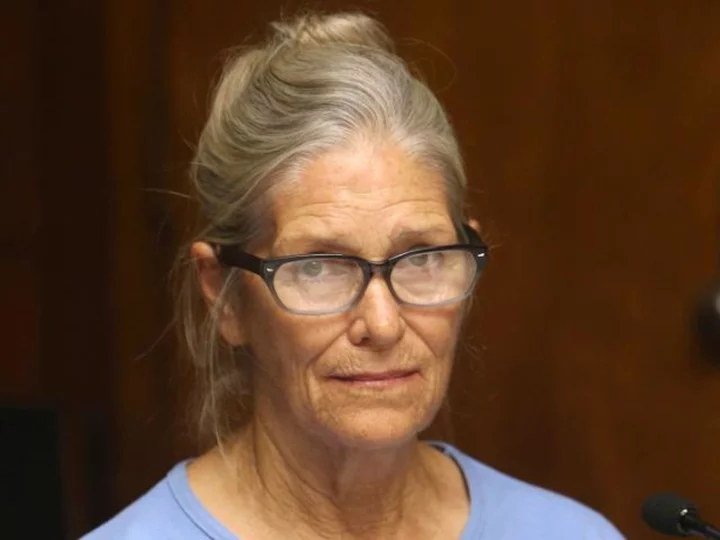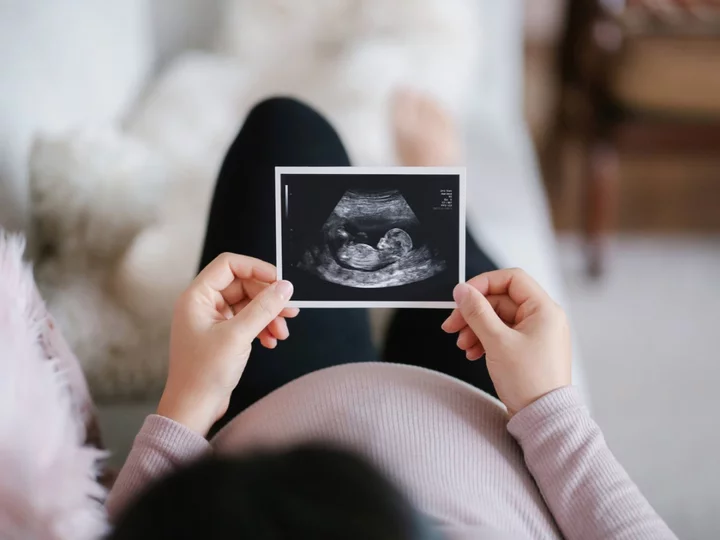
Prue Leith says the state must ‘sometimes’ step in to tackle child obesity
Prue Leith has said that the state “sometimes” needs to step in to deal with child obesity, after a report claimed that every UK government in the last 30 years has feared being labelled a “nanny state”. The Great British Bake Off judge said politicians must make a “really massive effort” to address issues that contribute to obesity and give people practical lessons and skills. Speaking at a hearing of The Times Health Commission, she said: “Sometimes the state has to be a nanny. We don’t mind the fact that the nanny state insists we go to school to learn maths. “So the nanny state who has to pay enormous sums of money to rectify the problem of obesity has every right to want the nation to learn to like good food and to learn about nutrition.” The Times Health Commission is a year-long inquiry set up to consider the future of health and social care in England. Leith continued at the hearing: “The long and short of getting people to eat healthy food is that if they don’t like it, they won’t do it. Even if they do it for a week they won’t do it for longer. So the only way to tackle it, I think is to get them to like it.” The South African chef cited cooking lessons as an effective way of helping people to learn how to eat healthier. “I think government after government have played around with this at the edges, there has been a little bit of enthusiasm and then it’s dropped again. It just has to be a really massive effort,” she added. Leith also believed there not “any point in lecturing everybody” about nutrition and said: “The poorest person in the country knows that vegetables are better for them than chocolate bars. But the knowledge isn’t enough. “So people who just say, ‘education, education’, yes, education is important. But the main thing is physical. Getting to like it,” she said. Leith’s comments come after the Institute for Government (IfG) published a report in April that claimed “fear of ‘nanny statism’” has resulted in politicians being “afraid of interfering in people’s choices, especially their diets”. Dr Dolly Theis, an expert in obesity policy at the University of Cambridge, told the Guardian: “Some governments have done much more than others. But the IfG is right that a general desire to avoid accusations of nanny statism, a lack of understanding about the issue, and a lack of political prioritisation have all contributed to this chronic policy failure.” This week, the government said in a new report that the link between the “higher consumption of ultra-processed foods and adverse health outcomes are concerning”, but did not recommend that a new labelling system be put in place to inform consumers of the risks. The report stopped short in spite of MPs suggesting in parliament that health warnings should be considered on packaging for “highly addictive” ultra-processed foods. In a previous statement, the Department for Health and Social Care said: “We are taking firm action to help people live healthier lives, including introducing restrictions on where unhealthy food is placed in supermarkets, calorie labelling on menus, and we work closely with industry to make it easier for people to make healthy food choices. “Trials of new obesity treatments and technologies are being backed by £20m of government funding, and we will introduce restrictions banning adverts on TV for foods and drinks high in fat, salt or sugar before 9pm, as well as paid-for adverts online.” Read More Nigella says extravagant dinner parties are a thing of the past – I wish she was wrong From Queen Camilla to Mary Berry: Who is in the Royal Box on the 10th day of Wimbledon? What are pani puri? The much-loved Indian street snack known by different names across the country Jennette McCurdy says her mother would ‘measure her thighs’ when she was 11 Children say ‘I’m bored’ 7 times a week – 7 ways to prevent it What are weight loss injections and what’s the controversy?
1970-01-01 08:00

Jennette McCurdy says her mother would ‘measure her thighs’ and ‘weigh her daily’ when she was 11
Jennette McCurdy has detailed how her mother encouraged her to engage in disordered eating when she was 11 years old. The former Nickelodeon star, 31, previously said that her mother, Debra McCurdy, “explicitly” told her how to eat in a way that would delay puberty so that she could continue to land child roles and therefore support her family financially. In a new interview with Louis Theroux on his podcast, The Louis Theroux Podcast, the iCarly actor opened up about exactly what her mother would do to promote disordered eating. “We partnered up to count our calories, she weighed me daily, she measured my thighs with a measuring tape, she taught me what diuretics were and we read calorie books together,” she recalled. McCurdy said that, to her 11-year-old self, it “felt amazing” to be “partners in crime” with her mother, and Debra told her that it was a “secret we shouldn’t tell anyone”. “I thought that was great because it was like a secret code language, nobody else knows what we’re doing, we could nod to each other and know that we were in this together, and nobody would be part of this.” However, Debra’s tactics to keep her daughter’s calories under control led to an “arduous relationship with food” for McCurdy. McCurdy explained that she began acting when she was six years old and began booking more significant roles when she was 11. She recalled playing characters that were younger than her actual age because she looked younger, and how her mother “made it clear that that was really helpful because casting directors like to cast older kids to play younger roles”. The actor said that one day, she felt a “lump” on her chest area and went to her mother out of fear that it was cancer. Debra has been diagnosed with breast cancer when McCurdy was two years old and later recovered. “I always had this fear of cancer recurring for her, cancer for me… it was just a constant fear,” she explained. “She reached her hand up my shirt, felt the lump and said, ‘Oh, Netty, no, you don’t have cancer, you’re just getting boobies.’ “That was truly as horrifying to me because it meant growing up and it had always been really clear to me that my mum did not want me to grow up. Not just for acting, but it also felt like her worth was tied up in me being young. With me being young, she had something to do, she felt good, me growing up kind of felt like her loss of purpose.” McCurdy asked Debra what she could do to “stop” her breasts from growing, which is when she introduced her daughter to calorie restriction. Speaking about her mother’s own eating disorder, which she had had “for years”, McCurdy recalled that Debra began restricting her food intake at the age of 14 by eating “one donut a day”. “The idea that this was abuse, that this was unhealthy, I couldn’t go anywhere near the reality of it,” she said. “I kept clinging to, ‘Oh, mum’s doing this because it’s what’s best for me, it’s what’s best for my career, she clearly wants what’s good for me,’ and I think a part of her believed that she wanted me to have a better life than she had, but I don’t think she ever stopped to consider what that actually meant, what does that look like, what does my daughter want. “She just assumed that her dreams must be everyone’s dreams, because of narcissism, I guess.” In her 2022 memoir, I’m Glad My Mother Died, McCurdy opened up about the abusive childhood she endured at the hands of Debra, who died in 2013 after her breast cancer returned. During her interview with Theroux, she also revealed that her mother would shower her until she was “17 or 18” and would give her “breast and vaginal exams”. “She would give me breast or vaginal exams in the shower and said that she was checking for lumps – she was just checking for cancer,” she recalled. But when McCurdy voiced how “uncomfortable” the experiences were, her mother became “hysterical”. McCurdy grew up in California with Debra, her father Mark McCurdy, and her three older brothers, Dustin, Marcus and Scott. Her best-selling memoir led to a two-book deal with Penguin Random House’s Ballantine Books label. For anyone struggling with the issues raised in this piece, eating disorder charity Beat’s helpline is available 365 days a year on 0808 801 0677. NCFED offers information, resources and counselling for those suffering from eating disorders, as well as their support networks. Visit eating-disorders.org.uk or call 0845 838 2040. Read More Nigella says extravagant dinner parties are a thing of the past – I wish she was wrong From Queen Camilla to Mary Berry: Who is in the Royal Box on the 10th day of Wimbledon? Kevin Costner ‘ordered to pay estranged wife $129k in monthly child support’, double his offer Children say ‘I’m bored’ 7 times a week – 7 ways to prevent it What are weight loss injections and what’s the controversy? What is group B strep? Charity says pregnant women ‘in the dark’
1970-01-01 08:00

What are weight loss injections and what’s the controversy?
With new research emerging, more questions have been raised about weight-loss injections, how they work, and the risks involved. Here are some of your questions answered. What are weight loss injections? Championed by some celebrities, including Elon Musk, weight loss injections were originally created to treat people with type 2 diabetes and other weight-related health issues. They are a type of prescription-based medical treatment that interferes with your metabolism, regulates your appetite and as a result encourages weight loss. The drugs belong to a class of medications known as glucagon-like peptide-1 receptor agonists, or GLP-1 RAs, which mimic the GLP-1 hormone, released in the gut after eating some food. The only FDA-approved stomach injections to help with weight management are semaglutide — sold under the brand names Ozempic, Wegovy and Rybelsus — and liraglutide — sold under Saxenda. But others are in development. Helen Knight, programme director of the Centre for Health Technology Evaluation at the National Institute for Health and Care Excellence (Nice) said: “We know that management of overweight and obesity is one of the biggest challenges our health service is facing with nearly two-thirds of adults either overweight or obese. It is a lifelong condition that needs medical intervention, has psychological and physical effects, and can affect the quality of life. “But in recent years Nice has been able to recommend a new line of pharmaceutical treatments which have shown that those people using them, alongside changes to their diet and exercise, have been able to reduce their weight.” How do they work? According to Nice’s independent appraisal committee, drugs like semaglutide should only be prescribed to patients as an alternative for weight management — alongside a reduced-calorie diet and increased physical activity in adults. They should also have a BMI of at least 35.0 kg/m2 (this is medically classified as obese), and especially, to people with a BMI of 30.0 kg/m2 to 34.9 kg/m2, have non-diabetic hyperglycaemia (blood sugar that is above normal but below those needed to diagnose diabetes) or are at high risk of other weight-related conditions such as strokes and heart attacks, due to other factors such as high blood pressure and high cholesterol. Using semaglutide as an example, a typical dose for weight loss is 2.4 milligrams, administered weekly as under-the-skin self-injections. How are they going to be rolled out? Nice formally recommended liraglutide, orlistat and semaglutide as medicines suitable to use for weight loss earlier this year. And with such drugs also available through online pharmacies by private prescription, a growing number of people have tried the jabs. If they are prescribed alongside a reduced-calorie diet, increased physical activity, and behavioural support, after a year, people taking them can lose up to 15% of their body weight, with results visible within the first month, according to the Nice clinical trials. Some weight loss injections are available on the NHS, but they are only prescribed under certain circumstances. Following an announcement of a £40 million two-year pilot on June 7, the government have said more people living with obesity will have access to the newest and most effective obesity drugs to help cut NHS waiting lists. What are the possible side effects? Europe’s drug regulator The European Medicines Agency (EMA) is investigating whether patients using some weight loss and obesity jabs are at risk of suicidal thoughts and thoughts of self-harm, which highlights some of the controversy surrounding the phenomenon. The EMA safety committee said it is looking at cases among people who use a semaglutide or liraglutide-containing medicine for weight loss – where “signals” were raised by the Icelandic Medicines Agency. “A signal is information on a new or known adverse event that is potentially caused by a medicine and that warrants further investigation,” the EMA said. “The case reports included two cases of suicidal thoughts, one following the use of Saxenda and one after Ozempic. One additional case reported thoughts of self-injury with Saxenda. “The semaglutide-containing medicine Wegovy and the liraglutide-containing medicine Saxenda are authorised for weight loss, together with diet and physical activity. “Suicidal behaviour is not currently listed as a side-effect in the EU product information of these medicines.” If you have a history of medullary thyroid cancer, gallbladder disease, or even pancreatitis, you should avoid taking weight loss injections like semaglutide. People who do take the prescription drug for weight loss sometimes experience dizziness, fatigue, and gastrointestinal issues — the most common side effects among patients — such as diarrhoea, constipation and gassiness. They are also at risk of getting headaches and stomach conditions including vomiting, bloating and nausea. Read More Charity boss speaks out over ‘traumatic’ encounter with royal aide Ukraine war’s heaviest fight rages in east - follow live Journalist and author Yomi Adegoke on the real-life consequences of social media What is group B strep? Charity says pregnant women ‘in the dark’ Britney Spears: I worked my ass off to get my memoir written
1970-01-01 08:00

Liechtenstein country profile
Provides an overview of Liechtenstein, including key facts about this small European state.
1970-01-01 08:00

NBA Rumors: Heat lowball Blazers, Lakers spoil Summer League, Brooks gets crazy
NBA Rumors: Lakers could spoil Colin Castleton's Summer League breakoutThe best rookie at Summer League for the Los Angeles Lakers has not been No. 17 pick Jalen Hood-Schifino. It hasn't been No. 40 pick Maxwell Lewis either. Instead, undrafted free agent Colin Castleton has been the shi...
1970-01-01 08:00

Former Manson family member Leslie Van Houten released from California prison, official says
Leslie Van Houten, a former Charles Manson follower and convicted murderer, was released from a California prison on Tuesday, a prison spokesperson told CNN.
1970-01-01 08:00

Is Bollywood a man’s world?
Researchers try to quantify just how severe the stranglehold of patriarchy on Hindi cinema is.
1970-01-01 08:00

NBA Rumors: 5 best trade destinations for Pascal Siakam
The Toronto Raptors are open to moving Pascal Siakam before the season. These five teams should get involved.Masai Ujiri and the Toronto Raptors front office have not been the most willing trade negotiators in recent years. Despite a torrential downpour of rumors involving Kyle Lowry, OG Anunoby...
1970-01-01 08:00

Tennis star Naomi Osaka welcomes baby girl with boyfriend Cordae
Naomi Osaka has welcomed a baby girl with rapper boyfriend Cordae. The 25-year-old tennis star welcomed her first child in Los Angeles, People reported on Tuesday 11 July. “They are doing well,” a source told the outlet. The couple, who have been dating since 2019, announced they were expecting their first child together in January. “Can’t wait to get back on the court but here’s a little life update for 2023,” Osaka captioned an Instagram post, which featured a photo of the baby’s ultrasound. In June, the four-time grand slam champion revealed on Instagram that she was expecting a baby girl. Osaka shared several photos from the princess-themed baby shower, which included a large sign with the words: “A Little Princess Is on the Way” Another photo showed the “Doomsday” rapper kissing Osaka’s growing baby bump. The pro athlete simply captioned the post with a purple and white heart emoji. Although Naomi Osaka is currently focused on being a mother, the former world number one tennis player still plans on returning to the court in 2024, after she had withdrawn from the Australian Open earlier this year. “The past few years have been interesting to say the least, but I find that it’s the most challenging times in life that may be the most fun,” she wrote in her pregnancy announcement. “These few months away from the sport has really given me a new love and appreciation or the game I’ve dedicated my life to,” Osaka continued. “I realise that life is so short and I don’t take any moments for granted, everyday is a new blessing and adventure. I know that I have so much to look forward to in the future, one thing I’m looking forward to is for my kid to watch one of my matches and tell someone, ‘that’s my mom’.” “2023 will be a year that’ll be full of lessons for me and I hope I’ll see you guys in the start of the next one ‘cause I’ll be at Aus 2024,” she added, confirming her return to the 2024 Australian Open. “Love you all infinitely.” While the couple have not yet revealed the name of their newborn baby, Osaka previously hinted at some of her baby name choices. “We have been discussing names. I would say that we are going for something more unique than traditional,” she told People earlier this year. Throughout her pregnancy, the Japanese tennis player admitted that she was gearing up to become the “best version” of herself for her daughter. “I would say for me, I just want to be the best version of myself,” Osaka said. “Obviously, I’ve never been a mother before so I’m taking it day-by-day and just trying to be someone that my son or daughter will be proud of.” Read More Naomi Osaka announces pregnancy and will miss rest of 2023 tennis season Naomi Osaka says she's pregnant, plans tennis return in 2024 Serena Williams announces pregnancy and shows off baby bump at Met Gala Foetuses use ‘greedy’ father gene to get more nutrients from mothers, study finds The meaning behind the name of Carrie and Boris Johnson’s third child Emilia Clarke’s brain haemorrhage ‘profoundly changed our lives’, says star’s mother
1970-01-01 08:00

Willie Nelson, Neil Young and John Mellencamp headline Farm Aid festival's return to Indiana
Rock legends Willie Nelson, Neil Young and John Mellencamp are highlighting farmers in the way that they know best: through song.
1970-01-01 08:00

Unborn babies use ‘greedy’ father gene to get more nutrients from mothers, study finds
Unborn babies are in a perpetual nutritional tug-of-war with their mothers due to a “greedy” gene inherited from their fathers, a new study suggests. Scientists from the University of Cambridge have found that foetuses use the gene to “remote-control” their mother into feeding them extra food and control her metabolism. While the mother’s body wants the baby to survive, it needs to keep enough glucose and fats circulating in her system for her own health in order to be able to deliver the child, breastfeed, and reproduce again. Amanda Sferruzzi-Perri, professor in Foetal and Placental Physiology, a Fellow of St John’s College and co-senior author of the paper, said: “It’s the first direct evidence that a gene inherited from the father is signalling to the mother to divert nutrients to the foetus.” Dr Miguel Constancia, MRC investigator based at the Wellcome-MRC Institute of Metabolic Science and co-senior author of the paper, said: “The baby’s remote control system is operated by genes that can be switched on or off depending on whether they are a ‘dad’s’ or ‘mum’s’ gene’, the so-called imprinted genes. “Genes controlled by the father are ‘greedy’ and ‘selfish’ and will tend to manipulate maternal resources for the benefit of the foetuses, so to grow them big and fittest. “Although pregnancy is largely cooperative, there is a big arena for potential conflict between the mother and the baby, with imprinted genes and the placenta thought to play key roles.” The new study looked at how the placenta communicates with the mother through the release of hormones so she can accommodate her baby’s growth. In pregnant mice, scientists selectively altered the signalling cells in the placenta that tell mothers to allocate nutrients to her developing foetuses. The baby’s genes controlled by the father tend to promote foetal growth and those controlled by the mother tend to limit foetal growth, experts say. Professor Sferruzzi-Perri explained: “Those genes from the mother that limit foetal growth are thought to be a mother’s way of ensuring her survival, so she doesn’t have a baby that takes all the nutrients and is too big and challenging to birth. “The mother also has a chance of having subsequent pregnancies potentially with different males in the future to pass on her genes more widely.” In the study researchers deleted the expression of an important gene called Igf2, which provides instructions for making a protein called “Insulin Like Growth Factor Two”. Similar to the hormone insulin, which is responsible for making glucose and controlling its levels in our circulation, the gene promotes foetal growth and plays a key part in the development of tissues including the placenta, liver, and brain. Dr Jorge Lopez-Tello, a lead author of the study based at Cambridge’s department of physiology, development and neuroscience, said: “If the function of Igf2 from the father is switched off in signalling cells, the mother doesn’t make enough amounts of glucose and lipids – fats – available in her circulation. “These nutrients, therefore, reach the foetus in insufficient amounts and the foetus doesn’t grow properly.” The scientists found that deleting the gene also affects production of other hormones that modulate the way the mother’s pancreas produces insulin, and how her liver and other metabolic organs respond. Babies with Igf2 gene defects can be overgrown or growth-stunted. And the researchers say that until now, it was not known that part of the gene’s role is to regulate signalling to the mother to allocate nutrients to the unborn child. The mice studied were smaller at birth and their offspring showed early signs of diabetes and obesity in later life. Professor Sferruzzi-Perri said: “Our research highlights how important the controlled allocation of nutrients to the foetus is for the lifelong health of the offspring, and the direct role the placenta plays. “The placenta is an amazing organ. At the end of pregnancy, the placenta is delivered by the mother, but the memories of how the placenta was functioning leaves a lasting legacy on the way those foetal organs have developed and then how they’re going to function through life.” The findings are published in the Cell Metabolism journal. Reporting by PA Read More It took until my thirties to realise I might not be white Carrie Johnson announces birth of third child with Boris Johnson: ‘Guess which name my husband chose’ How many children does Boris Johnson have? The meaning behind the name of Carrie and Boris Johnson’s third child Emilia Clarke’s brain haemorrhage ‘profoundly changed our lives’, says star’s mother How many children does Boris Johnson have?
1970-01-01 08:00

Frank Alfred Odysseus: The meaning behind the name of Carrie and Boris Johnson’s third child
On Tuesday 11 July, Carrie Johnson announced that she and former prime minister Boris Johnson have welcomed their third child together. Frank Alfred Odysseus Johnson was born on 5 July ay 9.15am, Carrie revealed in an Instagram post before joking: “Can you guess which name my husband chose?” Much has already been made about the choice of names on social media, with people quick to point out that the former PM is a fan of the Greek poet Homer and his epic poem The Odyssey, which tells the story Odysseus. But what does the name – and the child’s other names – actually mean? Odysseus takes its moniker from Homer’s poem, which follows the legendary king of the island of Ithaca on his , who is returning home at the end of the 10-year Trojan War. His journey takes an additional 10 years, during which his crewmates perish and he must face a number of threats. In the poem, which covers a decade-long journey, Odysseus is portrayed as exceptionally intelligent and courageous. He is one of the most influential Greek mythology heroes and the name is often associated with wisdom, pride, and heroism. As for the newborn’s first and second names, Frank comes from the Medieval Latin term, “Francus”, which means “free, at liberty, and exempt from service”, according to etymonline.com. It’s also thought to be connected to the Old French word, “franc”, which, similarly, means “not servile”, with other associations including sincere, genuine, open, gracious, generous, worthy, noble, and illustrious. However, Merriam-Webster claims that the name Frank itself comes from the Franks, “a West Germanic people who lived long ago”. The dictionary continues: “In the early Middle Ages the Franks were in power in France. (It was from them that the country got its name, in Latin Francia.) “The Franks eventually merged with the earlier Gaulish and Roman inhabitants, and their name (Francus in Latin) lost its ethnic sense and referred to any inhabitant of Francia who was free, that is, not a slave or bondman.” As for Alfred, the name is believed to mean “elf counsel” and is derived from the Old English name, Ælfræd. It’s a name often associated with wisdom and is most commonly associated with famous Alfreds, including the ninth-century king, Alfred the Great, filmmaker Alfred Hitchcock, and the poet Lord Alfred Tennyson. In 2019, the former PM was accused of misquoting Lord Tennyson while discussing Brexit, pledgingthat Britain would leave the EU on 31 October “do or die, come what may”. The phrase is often linked to Tennyson’s poem, The Charge of the Light Brigade, except the quote is, “Theirs not to reason why, theirs but to do and die”. Read More Carrie Johnson announces birth of third child with Boris Johnson: ‘Guess which name my husband chose’ How many children does Boris Johnson have? Buckingham Palace responds to Joe Biden’s ‘protocol breach’ with King Charles Rishi Sunak to meet King Charles as Truss defends her record - live Johnson was ‘begging people for votes’ in a ‘demeaning’ way, says IDS Welcome, PM Sunak – the last best option to take over from Truss
1970-01-01 08:00
